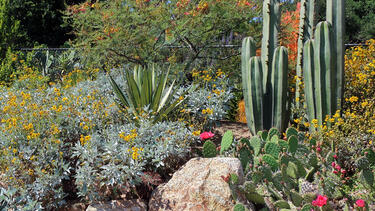Piloting a California Plant Nursery through COVID, Drought, and Wildfires
Haydi Danielson ’84, a graduate of Yale SOM and the Yale School of the Environment, is the co-owner of Boething Treeland Farms, a commercial nursery in California that her parents started in 1952. She discussed leading a family business through the COVID-19 pandemic and the drought and wildfires affecting her home state.
Q: How has Boething Treeland Farms navigated the pandemic?
We have been fortunate that very few of our employees have contracted COVID. As a company with over 500 employees, we do not qualify for PPP benefits, but have made it through the pandemic reasonably well so far. Agriculture is considered to be an essential business, so we have been able to continue working throughout the pandemic, and our employees have not missed very much time at all. Since the spring of last year when COVID caused lockdowns, we’ve seen demand for our plants actually increase. People who had never gardened before began gardening. We grow plants, shrubs, trees, perennials, and succulents for landscape contractors, landscape architects, and retail garden centers. There has been a big surge in demand from our retail garden center customers. That’s still persisting. That has been the silver lining of the pandemic for our industry.
Q: California has also been dealing with wildfires.
California has always had wildfires. They’re a necessary and beneficial part of the natural ecosystem. Most of the wildfires this year and last have been in forested areas, but some have destroyed homes and businesses. Because people have built in urban-wildland interface zones, there’s more property damage and desperation to put out the wildfires. Nobody wants their home to burn. I get that.
We had to evacuate last year. I live in the Santa Cruz area in a place covered with oak trees. There’s a ravine where a fire would love to come through and probably has over the millennia, but now that we live here, we’re hoping that it doesn’t.
Q: Are customers seeking different products from you as a result of the wildfires or the drought?
Because of the recent periods of drought, there is an increased demand for drought-tolerant species, but we’ve been growing those for decades, so it hasn’t significantly changed our plant palette or the nature of our business. Over half of the 1,000 varieties of plants we grow are low-water-use plants.
We have 10 nurseries, intentionally located in different climate zones throughout California. One of the nurseries is in the high desert, where it gets hotter and colder compared to our other nurseries. It lets us grow plants that are acclimated to desert conditions, where water is scarce and temperatures extreme. We grow plants in coastal Mediterranean climate regions, the Central Valley, and the high desert, so we are able to supply customers with plants that will thrive in a range of climate types, including in Nevada, Utah, Idaho, Oregon, Washington and Colorado.
Texas, Oregon, and Washington all had big winter storms in 2020-2021. A lot of nursery stock was destroyed in those states. That has created a lot of demand for California plants too. As a result, the California nursery industry is having to create more inventory than it has created in the past several years.
Q: What are the challenges facing your business?
The two biggest challenges to doing agricultural business in California are limited water supply and limited supply of labor.
Eight of our nurseries get their water from city supplies, and the cost keeps going up. We’re also required to join costly local water coalitions to help us comply with the reporting and testing of our irrigation water, drinking water, runoff water, and percolated water. Our two largest nurseries irrigate with ground water, pumped from deep aquifers that have not been impacted by drought conditions yet.
The challenges of doing business in California are real enough that, when we talk about growing our business, we’re thinking about going outside of California—maybe to the Southeast, where there’s more water and hopefully a better supply of labor. Somewhere the income taxes are a little lower and the regulations are a little less oppressive.
Q: Your parents started the company in 1952. What’s it like running a family business?
Family companies give you a lot of freedom. Working with family can be challenging, but I’d say it has worked pretty darn well for the last decade. My brother-in-law is the president and two of my sisters also work at the business. All four of the women in the second generation, including myself, sit on the company’s board of directors. We are all passionate about the business. It is like the little brother we never had.
My son has started working in the company. He’s the first to join the family business out of the six cousins who are the third generation. We will see if any of the others decide that it’s what they want to do. We hope to see the business continue to grow and make the world a better place one tree at a time for many years to come.
